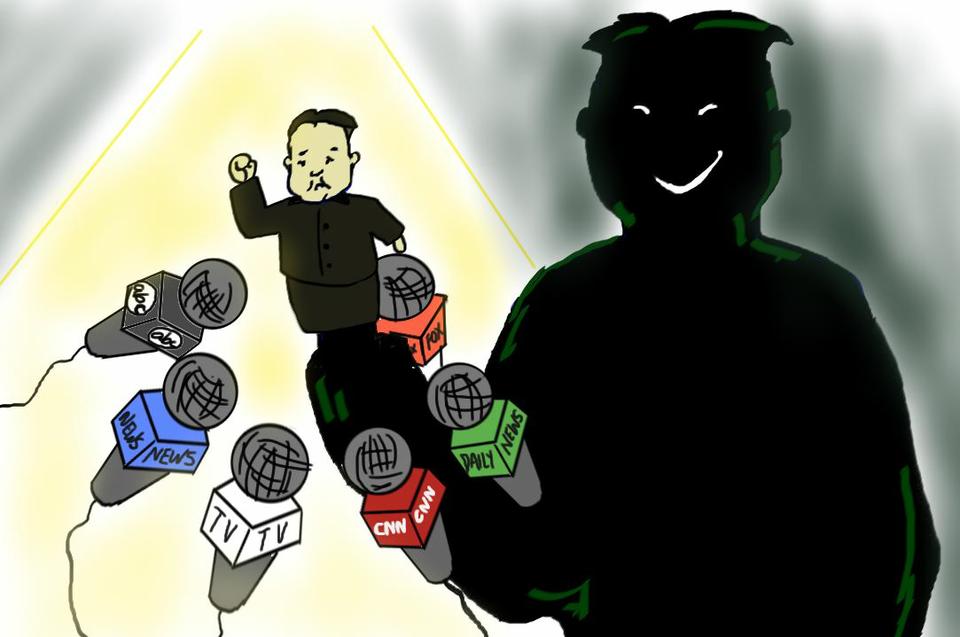
News
Harvard Quietly Resolves Anti-Palestinian Discrimination Complaint With Ed. Department

News
Following Dining Hall Crowds, Harvard College Won’t Say Whether It Tracked Wintersession Move-Ins

News
Harvard Outsources Program to Identify Descendants of Those Enslaved by University Affiliates, Lays Off Internal Staff

News
Harvard Medical School Cancels Class Session With Gazan Patients, Calling It One-Sided

News
Garber Privately Tells Faculty That Harvard Must Rethink Messaging After GOP Victory
Insanity and the International System
The attention received from the current crisis may be just what Kim Jong Un wants

At first, it was manufactured. Kim Jong Un’s brinkmanship on the Korean peninsula appeared an attempt to consolidate domestic support rather than cause any substantive change in the international system. Yet in a country completely closed to the outside world, his domestic actions have dominated the attention of the international news media.
According to a recent article in Foreign Policy, newspaper coverage of the regime has increased by 49 percent in the last 30 days, and web searches of the country have reached their highest point in over a decade, particularly in the United States. But the article also demonstrates the relatively large role of the United States within the crisis.
After all, North Korean propaganda and rhetoric emphasizes the United States, and, by extension, its allies, as the other great enemy along with South Korea. In a recent search of internet traffic, the only states that have covered Kim Jong Un’s actions more than the United States are Mongolia, the Philippines, Singapore, and South Korea.
With the interesting exception of Mongolia, all of these states have a compelling strategic interest in managing the North Korean threat. South Korea would obviously be the first victim of North Korean aggression. The Philippines and Singapore are both fervent American allies whom the Hermit Kingdom would most likely target soon after South Korea.
This also explains the differences in media coverage between the United States and the rest of the world. The majority of international news sources have analyzed the crisis in a regional context. Outlets such as The Guardian and the BBC have focused more on South Korea’s response than on international perceptions. The American media, on the other hand, has justifiably emphasized US involvement in the crisis.
These developments show two different aspects about the current state of the international system. The first aspect is the role of the United States, now more than two decades removed from the Cold War that laid the foundations for the current crisis.
In those two decades, the United States, for better or worse, has maintained its position as the sole global superpower. But after a decade of entrapment in foreign conflicts and an unclear doctrine towards interventions in Libya and Syria, the United States still has not established its role as the global leader.
U.S. foreign policy simultaneously emphasizes both activism and restraint: faith in American exceptionalism to defend democracy and disenchantment with the requirements to actually do so. And the question of America’s role as a global policeman, whether valid or not, still lingers without sufficient resolution more than a decade after the invasion of Iraq.
The recent media coverage of the conflict has overcome these ambiguities. By presenting the crisis as our own, the media has placed the conflict within the more traditional policies of the Cold War. An ally of the United States at risk is equivalent to the United States at risk. Whatever the outcome, there is near unanimous agreement that the United States has a role to play against North Korea if war actually occurs. And it very well may not.
And this brings us to the second point. North Korea may be a relic of 20th-century totalitarianism, but it is a relic that has learned to manipulate 21st-century technologies.
Like his predecessor, Kim Jong Un escalated rhetoric and made blustering threats in order to shore up domestic support. Unlike his father, however, Kim Jong Un realized that the more ludicrous his claims or actions, the more he would gain from the international spotlight.
A manufactured crisis to shore up political support thus gained momentum through the international media. The more threats that Kim Jong Un makes, the more attention that he gets. The more attention that he gets, the more powerful he becomes in his own eyes, even if that attention makes him a punch line in the West.
This is the tragedy of North Korea. The benefits of constant media attention have pushed Kim Jong Un to continuously escalate the situation. But rhetoric only goes so far. At a certain point, he must take physical action, like declaring a state of war or closing a jointly-run factory. And eventually action reaches its end goal. War occurs and Kim Jong Un meets his limits, to the detriment of everyone living on the Korean peninsula.
Raul Quintana ’14, a Crimson editorial writer, is a social studies concentrator in Leverett House. He is studying abroad at the University of Oxford this semester. His column appears on alternate Fridays.
Want to keep up with breaking news? Subscribe to our email newsletter.
